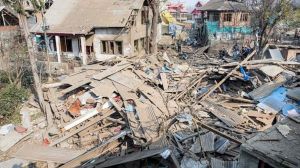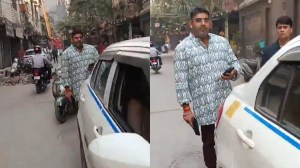Izzat-O-Iqbal — Daily devaluation of heroism
ANDREA: Unhappy land that has no heroes....''GALILEO: No. Unhappy the land that needs heroes.''Bertolt Brecht -- Life of GalileoAway fr...

ANDREA: “Unhappy land that has no heroes….”
GALILEO: “No. Unhappy the land that needs heroes.”
Bertolt Brecht — Life of Galileo
Away from Delhi, where newspapers take unconscionably long to reach, I remained largely ignorant of what was happening in our wide and varied land. Belatedly, I came to learn that SSP A.S. Sandhu of the Punjab Police had committed suicide: a note found on his body said “Better to die than to live in dishonour.” I was greatly disturbed, though not because of any acquaintanceship with him. Of course, I know Punjab, and Taran Taran too, and like many other citizens I have grieved for its agony. But I was disturbed more on account of the questions of national importance raised by this grim tragedy.
Upon my return to the capital I read a very moving and impassioned statement by the former Director-General of the Punjab Police. I have had the benefit of meeting Sardar K. P. S. Gill, though only infrequently. It all goes quite far back to the days of the Assam agitation, when he had a duty to perform there and when I, in sympathy with the cause of the people of Assam, was doing all that I could to make the then Prime Minister’s life as difficult as I could. But that is altogether a different story, which I cite now only to assert absence of subjectivity relatively so, for total objectivity is, of course, impossible. One other reason: if we do not pay heed, if we continue even now, uncaringly, down this path of indifference to the substantive issues that confront us, and remain preoccupied with the trivial, then surely we will be called to account again.
Some aspects of this tragedy are so blindingly self-evident that they scarcely require elaboration. Human rights, probity in public affairs, accountability of the executive, all this is by now a given. But there remain critical gaps in our concerns. What, for example, about the temporal and moral authority of our State; what about sacrifice and heroism? Then, at least to me, what is galling and continues to trouble greatly is this daily devaluing of the heroic. Almost everything nowadays, including our values, are ersatz. After reaching Delhi I read that Sandhu could well have been killed! How, I wondered, does that exculpate the State? It further deepens our concerns about the dereliction of our duty towards those that serve the State. Is that not central to so much else that troubles our land today? And ought that late officer’s death not focus our attention on this disfiguring astigmatism? Let me cite another example of the devaluation of the heroic.
In the role of the Army in restoring order in Punjab and bringing back normalcy, one account is yet to be written. A young officer — let him and his unit go unnamed was ambushed during Operation Rakshak. His great valour was recognised and posthumously a high award was conferred upon him. His young widow was informed that as a rehabilitation measure, a gas agency would be granted to her. When she came to Delhi to complete the inevitable paperwork, the agencies of the State demanded a payment of Rs 7 lakh as convenience tax’! Relate this demand to a scrutiny of the list of those to whom this benefit was actually granted, and through discretionary quotas at that. There is a moral here, a deeply troubling one. Why do we do this to our own? Because we have lost our sense of the appropriate, because our veneration of heroes and the heroic has been reduced to hypocritical genuflections at the Yamuna Ghats by all these mournful leaders’. Our sensibilities are dulled by this soul-destroying preoccupation with the politics of the vote. In turn, this is the consequence of the greatest failing of independent India: a failure to establish a just, viable, compassionate and caring State, committed to the citizen.
When citizens find the State indifferent and uncaring, then the first, almost unconscious response is that of a withdrawal of allegiance. We have gone farther than that: we now unhesitatingly equate office with the State itself, and then treat it as a personal fiefdom. Inevitably, our self-proclaimed democratic ethos gets badly flawed. We have now abandoned even a pretence at good governance; grievance redressal or sunwai is now non-existent. How, I have often wondered, can we cope with extraordinary challenges to the authority of our country when we ourselves blunt its instruments? It is in this context that we have to reflect upon Sandhu’s tragedy and K. P. S. Gill’s cri-de-coeur. Because as in the case of individuals so also for institutions, including the State, loyalty is a two-way contract. And in this case the State has not been loyal to Sandhu though he, in his lifetime, was loyal beyond the call of duty. I recollect the then Minister of State for Internal Security telling me that the criminal justice system in Punjab had “collapsed”, and it remained moribund, for almost a decade. Had we then placed on hold our concern for human rights? And can 10 years of judicial pusillanimity be set right by such acts as resulted in Sandhu’s death? I had found in DIG Athwal’s murder in the the Golden Temple a sacrilege; and when that mindless operation called Blue Star resulted in the destruction of the Akal Takth, then publicly, and through the pages of this very paper, I had condemned the utter senselessness of it. The tragedy of the Delhi killings haunts us still, but what remains an unanswered demand is an accounting for the foul murder of at least 38 servicemen, travelling in trains, and all in uniform! I had then cautioned the government of the day that when a State fights shy of protecting its own uniformed personnel, then that State is not very far from losing it’s own Iqbal. We have, all over again, not stood up for the izzat of the state. Sandhu was not just left to fend for himself, the State abandoned him and — to my mind, much worse — his incarceration and humiliation were used to deflect attention. Do we want Punjab to travel down that road all over again?
The core issues that confront us today orbit around three nouns: honour, heroism, loyalty. No nation can survive if these coefficients of national consciousness are permitted to haemorrhage, through neglect, through ignorance, or worse, through design. That, in essence, is the message of Sandhu’s tragedy. That is also why I chose as the title of this contribution the motto of our Regiment of Artillery. There is a very great deal said in these two words; can we, collectively, aspire to reach their meaning, and then endeavour to endow our land and our people with the attributes? The writer is a BJP leader and Member of Parliament




- 01
- 02
- 03
- 04
- 05



























